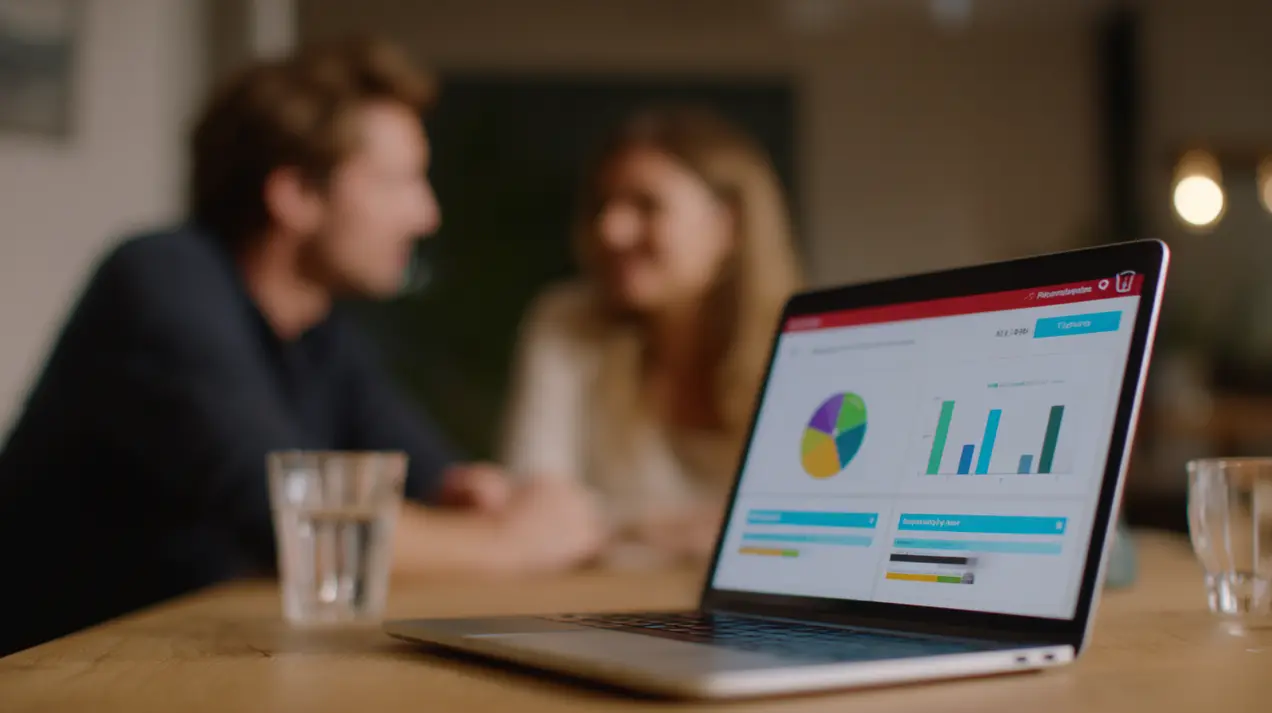In today's interconnected yet often isolated world, relationships face unprecedented challenges. From the demands of modern careers to the complexities of digital communication, couples and individuals in Ireland are navigating uncharted waters when it comes to maintaining healthy, fulfilling relationships. According to recent statistics from the Central Statistics Office, marriage rates in Ireland have declined by 3.8% from 2023 to 2024, with only 20,348 marriages registered last year, reflecting the growing pressures on relationships in our modern society.
As relationship dynamics evolve, so too must the support systems available to nurture and strengthen these vital connections. Online therapy has emerged as a powerful, evidence-based solution for those experiencing relationship challenges, offering professional support without the traditional barriers of location, scheduling, and accessibility.
At Feel Better Therapy, we connect you with certified Irish therapists, offering professional relationship support from the comfort of your home. Whether you're part of a couple seeking to strengthen your bond, navigate a specific challenge, or an individual looking to address relationship patterns, our tailored online therapy services empower you to take control of your relationship health through accessible, effective digital solutions.
The Evolution of Relationship Support in Ireland
Relationship counselling in Ireland has undergone significant transformation over the decades. Traditionally, couples seeking support would need to visit a therapist's office, often located in urban centres, creating immediate barriers for those in rural areas or with complex schedules. These services were frequently associated with religious institutions, particularly the Catholic Church, which influenced both their availability and approach.
The landscape began shifting in the early 2000s as secular relationship support services expanded, offering more diverse approaches to couples facing challenges. However, these services remained predominantly in-person, requiring both partners to attend sessions together at specified times and locations—a logistical challenge that prevented many from accessing the support they needed.
The COVID-19 pandemic catalysed a dramatic acceleration in the adoption of digital therapy solutions. What began as a necessity quickly revealed itself as an opportunity, with many therapists and clients discovering unexpected benefits to the online format for relationship work. By 2023, a survey by the Irish Association for Counselling and Psychotherapy found that 68% of relationship therapists in Ireland were offering online services, compared to just 12% in 2019.
Current Relationship Challenges in Ireland
Today's Irish couples face a unique constellation of stressors that differ significantly from previous generations:
Economic pressures: The ongoing housing crisis and cost of living challenges create significant strain on relationships, with financial disagreements consistently ranking amongst the top reasons couples seek therapy. The Central Statistics Office reports that 42% of couples cite financial stress as a major source of relationship conflict.
Work-life balance struggles: Ireland's evolving work culture, with increasing demands and the blurring of boundaries between professional and personal life, contributes significantly to relationship strain. The rise of remote and hybrid work arrangements has created new challenges for couples sharing living and working spaces.
Digital intrusion: Technology, whilst connecting us in unprecedented ways, has introduced new relationship challenges. A 2024 study by University College Dublin found that 37% of Irish couples report conflicts related to technology use, including social media jealousy, digital boundary issues, and "phubbing" (snubbing one's partner in favour of a mobile phone).
Changing relationship expectations: Modern relationships carry higher expectations for emotional fulfilment and personal growth than in previous generations. Many Irish couples now seek therapy not only to resolve conflicts but to actively strengthen and enhance their relationships.
The Growing Acceptance of Online Support
The shift towards digital relationship support has been accompanied by changing attitudes about therapy in general. The stigma once associated with seeking relationship help has diminished significantly, with a 2025 survey indicating that 64% of Irish adults now view relationship counselling as a sign of commitment rather than failure—a dramatic increase from 31% in 2015.
This cultural shift has coincided with increased comfort using video-based communication for meaningful interactions. What once seemed impersonal—connecting through screens—has become normalised through both professional and personal experiences. Many couples report already using video calls to maintain connection during separations, making the transition to online therapy feel natural and comfortable.
The integration of technology into intimate relationships has also evolved. From online dating platforms that now account for 31% of new relationships in Ireland to couples apps designed to enhance connection, digital tools have become an accepted part of relationship formation and maintenance. This technological integration has paved the way for greater acceptance of online therapy as a legitimate and effective approach to relationship support.

How Online Relationship Therapy Works
Online relationship therapy translates the proven approaches of traditional couples and relationship counselling into a virtual environment, whilst adding unique elements that enhance the therapeutic experience. Understanding the mechanics of this process can help you determine if it's the right choice for your relationship needs.
The Virtual Therapy Environment
At Feel Better Therapy, our online relationship sessions take place on a secure, encrypted video platform specifically designed for therapeutic interactions. This environment prioritises both clinical effectiveness and user privacy:
Platform security: All sessions are conducted through end-to-end encrypted connections that meet the highest standards for healthcare data protection. Video sessions are never recorded, and all communication remains confidential between you and your therapist.
Session structure: Online relationship therapy sessions typically last 50-60 minutes, similar to traditional in-person therapy. Your therapist will guide the conversation, ensuring both partners have equal opportunity to speak and be heard. Visual cues and specialised techniques help manage the flow of conversation in the virtual space.
Technology requirements: You'll need a device with a camera and microphone (computer, tablet, or smartphone) and a stable internet connection. We recommend using headphones for better audio quality and increased privacy. Our platform works across multiple devices, allowing flexibility in how you connect.
Therapeutic Approaches in the Digital Space
Our therapists are trained in multiple evidence-based approaches for relationship therapy, all of which have been successfully adapted for online delivery:
Emotionally Focused Therapy (EFT): This approach helps identify and transform negative interaction patterns into positive, secure connections. In the online format, therapists use screen positioning and digital cues to help partners recognise emotional responses and develop new patterns of interaction. Research shows that EFT adapted for online delivery maintains its effectiveness, with one 2023 study finding comparable outcomes to in-person EFT. Learn more about EFT from the International Centre for Excellence in EFT.
The Gottman Method: Based on over four decades of research, this approach focuses on strengthening friendship, managing conflict, and creating shared meaning. Online delivery allows therapists to share visual resources and exercises in real-time through screen sharing, enhancing the educational components of this method. The Gottman Institute provides extensive research on relationship dynamics.
Solution-Focused Brief Therapy: This goal-oriented approach concentrates on finding solutions rather than dwelling on problems. The structured nature of this therapy translates well to online sessions, with digital tools allowing for clear goal-setting and progress tracking between sessions.
Narrative approaches: These methods help couples rewrite their relationship stories, focusing on strengths and positive experiences rather than problems. The slight distance created by the online format can sometimes make it easier for couples to step back and view their relationship narrative from a new perspective.
Individual vs. Couples Sessions Online
Online relationship therapy offers flexible configurations to meet your specific needs:
Joint sessions: Both partners attend the session simultaneously, either from the same location or from different locations. When joining from the same location, we recommend using a single device with both partners in frame to facilitate natural interaction. When joining from separate locations, our platform allows both partners and the therapist to see and hear each other clearly.
Individual sessions: Sometimes, relationship therapy includes sessions with each partner individually. Online therapy makes this particularly convenient, as sessions can be scheduled at times that work for each person without requiring coordination of travel or childcare.
Combined approaches: Many effective treatment plans include both joint and individual sessions. Your therapist will recommend the most appropriate structure based on your specific situation and goals.
The online format offers unique advantages for managing relationship dynamics during sessions. The virtual setting can create a sense of equal footing, sometimes reducing power imbalances that might be more pronounced in physical spaces. The therapist can also use features like temporarily muting one partner to ensure both voices are heard equally—a technique that helps manage interruptions and create space for each person to express themselves fully.

The Science Behind Online Relationship Therapy
The effectiveness of online therapy for relationship issues is supported by a growing body of research. Far from being a compromise or second-best option, digital therapeutic interventions have demonstrated outcomes comparable—and in some cases superior—to traditional face-to-face therapy for relationship challenges.
Research Evidence Supporting Effectiveness
A landmark 2024 study published in the Journal of Marital and Family Therapy compared outcomes for 320 couples randomly assigned to either online or in-person relationship therapy. The results showed no statistically significant difference in relationship satisfaction improvement between the two groups after 12 weeks of treatment, with both showing approximately 65% of couples experiencing meaningful clinical improvement.
In Ireland specifically, a 2023 evaluation conducted by researchers at Trinity College Dublin examined outcomes for 150 couples who received online relationship therapy during and after the pandemic. The study found that 71% of couples reported improved relationship satisfaction, with 68% showing sustained improvement at six-month follow-up—rates comparable to those typically seen in traditional face-to-face therapy.
Other compelling research findings include:
•A 2025 meta-analysis examining 28 randomised controlled trials with over 2,100 couples found that online relationship therapy produced outcomes equivalent to face-to-face therapy across multiple measures, including relationship satisfaction, communication quality, and conflict resolution skills.
•Research from the University of California demonstrated that properly supported online therapy for relationship issues resulted in dropout rates of just 18%, compared to the 27% typically seen in face-to-face relationship therapy—suggesting that the online format may actually enhance engagement and completion.
•A 2024 longitudinal study tracking couples for 18 months found that gains made through online relationship therapy were maintained at follow-up, dispelling concerns about the durability of improvement.
Benefits of the Digital Format for Relationship Work
The online format offers several unique advantages that can enhance the therapeutic process for relationship issues:
Enhanced accessibility for both partners: One of the most significant barriers to traditional couples therapy is scheduling—finding a time when both partners can attend can be challenging. Online therapy eliminates travel time and offers greater scheduling flexibility, making it easier for both partners to commit to the process. This is particularly valuable when partners have different work schedules or other commitments.
Reduced power dynamics: The neutral territory of a virtual session can sometimes help balance relationship dynamics. Neither partner is on "home turf," and both are equally visitors in the therapeutic space. Research suggests this can help create a more level playing field for communication, particularly in relationships with established power imbalances.
Digital tools for relationship assessment: Online platforms allow for efficient use of relationship assessment tools, with results that can be easily shared and discussed during sessions. These assessments help identify specific areas of strength and challenge in the relationship, allowing for more targeted therapeutic interventions.
Technology as an Enhancer of the Therapeutic Process
Rather than creating distance or diminishing the therapeutic experience, technology offers several enhancements to relationship therapy:
Screen sharing capabilities: Therapists can share educational resources, exercises, and visual aids in real-time, enhancing the learning components of therapy. This might include relationship models, communication frameworks, or specific exercises for the couple to practise.
Digital relationship exercises: Online therapy platforms often include features for structured exercises between sessions. These might include guided communication practices, shared journaling spaces, or specific activities designed to build connection. The digital format allows therapists to provide clear instructions and templates, increasing the likelihood that couples will engage with between-session work.
Recording options: With appropriate consent, some sessions or exercises can be recorded for couples to review later. This can be particularly valuable for communication work, allowing couples to observe their interaction patterns from an outside perspective and reinforce learning from sessions.
The evidence is clear: online therapy represents a scientifically validated approach to relationship support, with results comparable to traditional methods and several unique advantages that can enhance the therapeutic experience. The American Psychological Association has published extensive guidelines on telepsychology that support these findings.

Unique Benefits of Online Relationship Therapy
Online relationship therapy offers several distinct advantages that address common barriers to seeking help and create new opportunities for effective therapeutic work. These benefits make digital solutions particularly valuable for many Irish couples and individuals facing relationship challenges.
Accessibility Advantages
Eliminating geographical barriers: For couples in rural Ireland, accessing specialised relationship therapy often meant travelling significant distances to urban centres. Online therapy eliminates this barrier entirely, connecting you with relationship specialists regardless of your location. This is particularly valuable for those in counties with limited mental health resources, where finding a therapist with specific relationship expertise might otherwise be impossible.
A client from rural County Mayo shared: "Living over an hour from the nearest city made traditional couples therapy seem impossible with our work schedules. Being able to connect with a specialist therapist online has made all the difference—we're getting expert help without the 2+ hours of driving each week."
Scheduling flexibility: Finding a time when both partners can attend therapy is often a significant challenge. Online therapy offers greater scheduling flexibility, including evening and weekend appointments that accommodate work commitments. This flexibility means you're more likely to maintain consistent attendance—a key factor in successful relationship therapy.
Options for partners in different locations: For couples in long-distance relationships, those who travel frequently for work, or those temporarily separated, online therapy provides a way to engage in relationship work together despite physical distance. This can be particularly valuable during transitional periods or when one partner is working abroad—situations that often create relationship strain precisely when support is most needed.
Privacy Considerations
Discretion for those concerned about stigma: Despite positive changes in attitudes towards therapy, many people still worry about being recognised when attending couples counselling. This concern can be particularly acute in smaller communities or professional settings where privacy feels limited. Online therapy eliminates this concern entirely, allowing you to access support without these worries. Mental Health Ireland advocates for reducing stigma around seeking mental health support.
Comfort of engaging from familiar environment: The comfort of your own space can create an ideal setting for relationship work. Being surrounded by familiar objects and comforts can help reduce the anxiety that might be present in an unfamiliar office setting. This sense of safety can be particularly beneficial when discussing difficult topics or when feeling vulnerable during relationship exploration.
Reduced anxiety about being seen attending therapy: For many couples, the prospect of being seen entering a therapist's office creates significant anxiety. Online therapy removes this barrier entirely, allowing you to engage in relationship work without concern about public perception. This is particularly valuable in communities where traditional values might still attach stigma to seeking relationship help.
Practical Benefits
No travel or childcare arrangements needed: The logistical challenges of attending in-person therapy extend beyond simple scheduling. Travel time, traffic, parking, and childcare arrangements can all create additional stress—precisely what couples don't need when already facing relationship challenges. Online therapy eliminates these practical barriers, making the process more streamlined and less stressful.
Equal access for partners with mobility issues: For couples where one or both partners have mobility limitations, physical disabilities, or chronic health conditions, attending in-person therapy may present significant challenges. Online therapy ensures equal access to quality relationship support regardless of physical limitations.
Easier integration into busy lifestyles: Modern life is busy, and finding time for relationship work can be challenging. Online therapy reduces the total time commitment by eliminating travel, making it easier to integrate sessions into even the busiest schedules. This efficiency means couples are more likely to prioritise and maintain their therapy commitment.
Cost-effectiveness
Reduced associated expenses: Whilst the session fee is just one cost of therapy, traditional in-person treatment often involves additional expenses: transport costs, parking fees, childcare during appointments, and time away from work. Online therapy eliminates these associated costs, making treatment more economically accessible—an important consideration given the financial strain that often accompanies or exacerbates relationship difficulties.
Time savings: Time is a precious commodity, particularly for couples juggling work, family, and other commitments. Online therapy saves valuable time by eliminating travel to and from appointments—time that can instead be used for self-care, relationship connection, or managing other responsibilities.
Value of early intervention: By removing barriers to access, online therapy makes it easier to seek help earlier, before relationship issues become severe. This preventative approach can reduce the overall duration and intensity of treatment needed, providing better value in the long term and potentially preventing relationship breakdown. The HSE emphasises the importance of early intervention in mental health care.
These benefits make online therapy an excellent option for many people experiencing relationship challenges, combining clinical effectiveness with practical advantages that address many common barriers to treatment.

Common Relationship Issues Addressed Through Online Therapy
Online relationship therapy can effectively address a wide range of issues that couples and individuals face. Our experienced therapists are equipped to help with virtually any relationship challenge through our secure digital platform.
Communication Breakdowns
Communication difficulties lie at the heart of many relationship problems, and the digital age has introduced new complexities to how we connect with our partners:
Digital miscommunication: Text messages, emails, and social media have created new opportunities for misunderstanding. Online therapy helps couples develop clear digital communication protocols and understand how technology might be affecting their connection. Therapists can guide couples in recognising how tone and intent can be lost in digital messages and develop strategies for clearer communication across all channels.
Conflict escalation patterns: Many couples find themselves trapped in repetitive argument cycles that quickly escalate. Through video sessions, therapists can observe these patterns in real-time and help couples develop interruption strategies. The slight delay inherent in video calls can actually be therapeutic in this context, creating a natural pause that helps partners respond rather than react.
Emotional expression challenges: Many people struggle to express their deeper feelings to partners, leading to disconnection and misunderstanding. Online therapy provides structured opportunities to practise emotional expression in a supported environment. Therapists can use digital tools like emotion wheels and guided exercises to help clients identify and articulate feelings more effectively.
A client recently shared: "We were constantly misinterpreting each other's texts and emails, which would lead to days of tension. Our online therapist helped us see how our different communication styles were clashing in the digital space and gave us practical tools to prevent these misunderstandings."
Trust and Intimacy Concerns
Trust and intimacy issues can be particularly challenging but respond well to skilled therapeutic intervention:
Rebuilding connection virtually: When trust has been damaged or intimacy has faded, online therapy offers structured approaches to rebuilding connection. Digital exercises like guided conversations, shared journaling, and virtual date nights can help couples rediscover their bond. The therapist provides frameworks and feedback to make these experiences meaningful and productive.
Addressing digital infidelity and online boundaries: The digital world has created new forms of infidelity and boundary violations, from inappropriate social media interactions to online affairs. Online therapy helps couples establish clear digital boundaries and rebuild trust after breaches. Therapists can guide conversations about what constitutes appropriate online behaviour within the relationship and help couples develop agreements that respect both individual autonomy and relationship commitments.
Creating intimacy in the digital age: Many couples struggle to maintain meaningful connection in an era of constant distraction. Online therapy helps identify how technology might be interfering with intimacy and develop strategies for protected relationship time. Therapists can help couples create "digital-free zones" in their relationship and rediscover the art of focused attention.
Life Transitions and External Stressors
Relationships often face their greatest challenges during periods of transition or external stress:
Managing work-life balance: The boundaries between work and home life have become increasingly blurred, particularly with the rise of remote work. Online therapy helps couples develop strategies for maintaining relationship quality amid professional demands. Therapists can guide couples in establishing healthy boundaries, creating transition rituals between work and relationship time, and ensuring both partners' needs are met.
Navigating parenthood and family dynamics: Becoming parents or blending families creates profound relationship changes that require adaptation. Online therapy offers flexible support during these demanding transitions, with sessions that can accommodate unpredictable schedules and childcare constraints. The ability to attend therapy from home is particularly valuable for new parents or those with young children.
Financial stress and planning: Money concerns rank amongst the most common sources of relationship conflict. Online therapy provides a structured environment to discuss financial values, develop shared goals, and create practical plans. Therapists can help couples understand how their individual money histories and attitudes affect their relationship and develop healthier financial communication. The Money Advice and Budgeting Service (MABS) offers additional financial guidance for Irish families.
Relationship Growth and Enhancement
Not all couples seek therapy because something is "wrong"—many want to strengthen an already good relationship:
Preventative relationship maintenance: Just as regular health check-ups prevent physical problems, relationship maintenance prevents emotional disconnection. Online therapy offers convenient check-in opportunities that couples can integrate into busy lives. Regular sessions focused on relationship strengths and potential growth areas can help prevent small issues from becoming significant problems.
Building stronger connections: Even healthy relationships benefit from intentional growth and deepening. Online therapy provides structured opportunities to enhance understanding, appreciation, and connection. Therapists can guide couples through exercises designed to deepen knowledge of each other and create meaningful shared experiences.
Developing shared goals and values: Creating a vision for the future together strengthens relationship bonds. Online therapy helps couples identify and align their values and goals, creating a roadmap for their shared journey. Therapists can facilitate conversations about life direction, priorities, and dreams that might otherwise get lost in day-to-day logistics.
Through our secure online platform, Feel Better Therapy provides effective support for all these relationship challenges and more, tailored to your specific situation and goals. For additional relationship resources, Relate UK offers helpful articles and guidance.

The Feel Better Therapy Approach to Online Relationship Support
At Feel Better Therapy, we've developed a comprehensive approach to online relationship therapy that combines evidence-based techniques with the convenience and accessibility of digital delivery. Our process is designed to provide personalised, effective support for anyone experiencing relationship challenges in Ireland.
Initial Assessment Process
Your journey begins with a thorough assessment of your relationship concerns, history, and goals. This helps us understand your unique situation and needs:
Individual and joint evaluations: Our assessment process typically includes both a joint session with both partners and brief individual consultations. This approach ensures we understand both the shared relationship dynamic and each partner's perspective. For individuals seeking relationship support, the assessment focuses on relationship patterns, goals, and current challenges.
Relationship history and goals exploration: We take time to understand your relationship story—how you met, key milestones, previous challenges, and what's brought you to therapy now. We also explore your goals: what you hope to achieve through therapy and what a successful outcome would look like for you. This comprehensive picture helps guide the therapeutic process.
Customised treatment planning: Based on your assessment, we develop a tailored treatment plan that addresses your specific concerns and goals. This plan outlines the therapeutic approaches we'll use, estimated timeframe, and specific objectives. We review this plan with you to ensure it aligns with your expectations and make adjustments as needed.
Therapist Matching for Relationship Issues
Finding the right therapeutic match is crucial for successful relationship work. Our matching process considers multiple factors to ensure you work with a therapist whose expertise and approach align with your needs:
Expertise in specific relationship challenges: Our therapists have different specialisations within relationship therapy—some focus on communication issues, others on intimacy concerns, trust rebuilding, or life transitions. We match you with a therapist whose expertise aligns with your primary concerns.
Cultural competence for Irish couples: Our therapists understand the unique cultural context of relationships in Ireland, including family dynamics, social expectations, and specific stressors affecting Irish couples today. This cultural awareness ensures that therapy is relevant and appropriate to your lived experience.
Approach aligned with couple's needs and preferences: Different therapeutic approaches resonate differently with different couples. Some benefit most from structured, skills-based approaches, whilst others need more exploratory, emotion-focused work. Our matching algorithm considers your preferences and needs to find the most effective therapeutic fit.
Session Structure and Frequency
Our online relationship therapy is designed to be flexible whilst maintaining the structure needed for effective progress:
Flexible scheduling options: Most couples begin with weekly 50-60 minute sessions, though this can be adjusted based on your needs and circumstances. We offer daytime, evening, and weekend appointments to accommodate various schedules. As you progress, session frequency may be adjusted, typically moving to fortnightly sessions as you develop stronger relationship skills.
Combination of individual and joint sessions: Depending on your specific situation, your therapist may recommend a combination of joint and individual sessions. This approach allows for both shared work on relationship dynamics and space to explore individual perspectives and concerns. The online format makes this combined approach particularly convenient, as sessions can be scheduled separately without additional travel or logistical complications.
Progress tracking and adjustment: Regular progress reviews help ensure therapy is moving in the right direction. Your therapist will check in periodically about your experience of the process and the changes you're noticing. Based on these discussions, the approach can be adjusted to better meet your evolving needs.
Between-session Support
Effective relationship therapy extends beyond your scheduled sessions. Our approach includes comprehensive between-session support:
Digital resources and exercises: Access to personalised relationship tools through our secure client portal. These might include communication exercises, reflection prompts, reading materials, and specific activities based on your treatment plan. These resources help you apply and practise what you're learning in therapy.
Communication practice tools: Structured frameworks for practising new communication skills between sessions. These might include guided conversation templates, active listening exercises, or conflict de-escalation techniques tailored to your specific patterns. Regular practice of these skills accelerates progress and helps integrate new patterns into daily life.
Crisis support protocols: Whilst online therapy sessions occur at scheduled times, we ensure you have appropriate support for moments of relationship distress. This includes clear guidance on managing conflict, access to emergency resources, and protocols for additional support when needed. In case of immediate crisis, Samaritans Ireland provides 24/7 support.
Through this comprehensive approach, we provide online relationship therapy that is personalised, evidence-based, and designed to fit seamlessly into your life.
Client Experiences: Relationship Success Stories
The effectiveness of online relationship therapy is perhaps best illustrated through the experiences of those who have benefited from it. Whilst every relationship journey is unique, these anonymised case studies highlight how online therapy has helped individuals and couples with different relationship challenges.
Long-term Marriage Revitalisation
Michael and Catherine, in their late 50s from Dublin, had been married for 28 years when they sought therapy. After their children left home, they found themselves feeling like "polite roommates" rather than partners. Years of focusing on parenting and careers had left their relationship lacking intimacy and meaningful connection.
"We'd been drifting apart for years but kept putting off getting help because it felt like one more appointment to squeeze into already busy lives. The online format made it so much easier to commit—we could connect with our therapist right after dinner, without the stress of commuting across the city."
Working with their online therapist, Michael and Catherine identified how their communication had become purely functional and how they'd stopped sharing their inner worlds with each other. Through structured exercises and guided conversations, they began rediscovering each other as individuals rather than just in their roles as parents and professionals.
After four months of online therapy, they reported a significant renewal in their relationship. They had established new rituals of connection, improved their communication about emotional needs, and rekindled physical intimacy. They particularly valued the privacy of online sessions:
"Discussing intimate aspects of our relationship felt less embarrassing from the comfort of our own home. We could be more authentic and open than I think we would have been in a therapist's office."
Young Couple Navigating Commitment Issues
Aoife and James, both in their early 30s from Cork, sought therapy when they reached an impasse about the future of their three-year relationship. James was hesitant about marriage and children, whilst Aoife felt ready to move forward. The difference was creating tension and uncertainty that affected their daily interactions.
"We both travel frequently for work, which made finding a therapist we could both see regularly seem impossible. Online therapy solved that problem—we've had sessions where one of us was at home and the other in a hotel room whilst travelling. Without that flexibility, we probably would have given up on therapy after a few weeks."
Through online sessions, their therapist helped them explore the root of James's hesitation, which stemmed from concerns about replicating his parents' difficult marriage, rather than doubts about his feelings for Aoife. They worked on communicating fears and expectations more clearly and developed a shared vision for their future that respected both partners' timelines and concerns.
After six months of therapy, they had developed a mutual understanding and plan for their future that both felt comfortable with. They continued occasional "maintenance" sessions to check in on their progress and address any emerging concerns:
"The digital format actually helped us be more direct with each other. Something about the slight distance made it easier to say the hard things that we'd been dancing around for months. Our therapist was skilled at noticing when one of us would withdraw and would help bring us back to the conversation."
Individual Working Through Relationship Patterns
Liam, a 42-year-old from Galway, sought therapy after recognising a pattern in his romantic relationships. Despite wanting a lasting partnership, he found himself repeatedly attracted to emotionally unavailable partners, with relationships typically ending after 6-12 months when he began pushing for deeper commitment.
"As someone living in a small community, I was concerned about confidentiality when seeking therapy for something so personal. Online therapy meant I could work with a specialist in relationship patterns without worrying about running into my therapist at the local shop or having my car recognised outside a therapy office."
Through online sessions, Liam explored how his early family experiences had shaped his attachment style and relationship expectations. He identified how he was unconsciously recreating familiar dynamics from childhood and developed strategies for recognising and changing these patterns.
After eight months of therapy, Liam reported significant insights into his relationship choices and had begun dating with new awareness and healthier boundaries. He particularly valued the consistency that online therapy allowed:
"My work schedule changes frequently, which would have made regular in-person therapy nearly impossible. Being able to adjust my therapy time when needed, without having to factor in travel time, meant I could maintain consistent sessions even during busy periods. That consistency was crucial to the progress I made."
These stories represent just a few of the many successful outcomes we've seen through online relationship therapy. Whilst the specific techniques and timelines vary based on individual needs, the consistent themes are accessibility, flexibility, and the effective integration of therapy into daily life—benefits that make online therapy particularly valuable for relationship work.

Is Online Relationship Therapy Right for You?
Whilst online therapy offers many benefits for relationship issues, it's important to consider whether this approach aligns with your specific needs and circumstances. This section will help you assess whether online therapy might be the right choice for you.
Self-assessment Questions to Consider
Relationship goals and challenges: Consider what you hope to achieve through therapy. Is it improved communication, rebuilding trust, enhancing intimacy, navigating a specific life transition, or exploring relationship patterns? Online therapy is effective for most relationship concerns, though some situations may benefit from additional in-person support.
Technology comfort level: How comfortable are you with video calls and digital tools? Whilst our platform is designed to be user-friendly, basic comfort with technology will enhance your experience. Consider whether you have:
•A device with a camera and microphone (computer, tablet, or smartphone)
•A reliable internet connection
•A basic understanding of video calling
Home environment considerations: Do you have access to a private, quiet space for therapy sessions? Consider whether you can:
•Find a space where you won't be overheard or interrupted
•Set aside uninterrupted time for sessions
•Create a comfortable environment conducive to therapeutic work
When Online Therapy Might Be Especially Beneficial
For couples with scheduling conflicts: If coordinating schedules has been a barrier to seeking help, online therapy offers greater flexibility. This is particularly valuable for couples with different work shifts, frequent travel, or caregiving responsibilities that make regular in-person appointments difficult.
For those in long-distance relationships: If you and your partner live in different locations—whether temporarily or permanently—online therapy allows you to engage in relationship work together despite the distance. This can be particularly valuable during transitional periods or for maintaining connection across geographical separation.
For individuals exploring relationship patterns: If you're seeking therapy to understand and change patterns in your relationships, online therapy offers privacy and convenience that might make the process feel more accessible. The ability to engage from your own space can create a sense of safety when exploring vulnerable topics.
For rural residents with limited local options: If you live in an area with few relationship specialists, online therapy connects you with experienced therapists regardless of your location. This ensures access to quality relationship support without geographical limitations.
When Traditional Face-to-Face Might Be Preferable
Severe crisis situations: If you're experiencing domestic violence, acute safety concerns, or severe mental health crises alongside relationship issues, immediate in-person assessment and support may be more appropriate. Online therapy is most effective when basic safety and stability are established. Women's Aid Ireland provides support for those experiencing domestic violence.
Certain complex relationship dynamics: Some relationship situations involving high conflict, significant trauma, or complex family systems might benefit from the containment of an in-person setting, particularly in the early stages of therapy. Your initial assessment will help determine if online therapy is appropriate for your specific situation.
Strong preference for physical presence: Whilst many people adapt quickly to the online format, if you strongly believe that you would benefit from being physically present with a therapist, your preference is valid and important to consider. The most effective therapy is one that you feel comfortable engaging with fully.
How to Make the Most of Online Relationship Therapy
If you decide that online therapy is right for you, these strategies can help you maximise its benefits:
Creating a comfortable therapy space: Designate a specific area for your therapy sessions that feels private and comfortable. Consider:
•Using headphones for better audio and increased privacy
•Ensuring good lighting so your therapist can see you clearly
•Having water and tissues nearby
•Using a comfortable chair that supports good posture
Minimising distractions: Take steps to reduce interruptions during your therapy time:
•Turn off notifications on your devices
•Let household members know you need privacy during this time
•Consider using a "do not disturb" sign if needed
•Close unnecessary applications on your device
Preparing for productive sessions: A few minutes of preparation can enhance your therapy experience:
•Reflect on what you want to discuss before the session begins
•Review any homework or practices from the previous week
•Take a few moments to transition mentally into "therapy mode"
•Have any relevant notes or questions ready
Online therapy for relationship issues can be highly effective when approached with commitment and engagement. By considering these factors and preparing appropriately, you can create an optimal environment for your therapeutic journey. The British Association for Counselling and Psychotherapy offers additional guidance on preparing for therapy.
Conclusion
Relationships are fundamental to human wellbeing, yet they face unprecedented challenges in today's fast-paced, digitally connected world. In Ireland, couples and individuals are navigating complex terrain—from economic pressures and changing social expectations to the integration of technology into our most intimate connections. These challenges require innovative, accessible solutions that meet people where they are.
Online relationship therapy has emerged as a powerful approach to supporting healthy connections, combining clinical effectiveness with unprecedented accessibility and convenience. The research is clear: digital therapeutic interventions produce outcomes comparable to traditional face-to-face therapy for relationship issues, with success rates that match or sometimes exceed in-person treatment.
The unique benefits of online therapy—from eliminating geographical barriers and offering flexible scheduling to providing a comfortable, private environment for vulnerable conversations—make it an excellent option for many people experiencing relationship challenges. These advantages address many of the common barriers that prevent couples and individuals from seeking the support they need.
At Feel Better Therapy, our approach combines evidence-based therapeutic techniques with the advantages of digital delivery. Through secure video sessions with qualified Irish therapists specialising in relationship issues, comprehensive between-session resources, and personalised treatment plans, we provide effective support tailored to your unique needs and circumstances.
The journey to improving your relationships begins with a single step—reaching out for support. Whether you're part of a couple seeking to strengthen your bond, navigate a specific challenge, or an individual looking to address relationship patterns, professional help can make a significant difference. The accessibility of online therapy means that support is available regardless of your location, schedule, or circumstances.
Taking the Next Step in Your Relationship Journey
If you're considering therapy for relationship issues, we encourage you to complete our form so we can match you with an online therapist best suited for your specific needs. Our team is committed to providing compassionate, effective support for your relationship journey through our secure online therapy platform, designed to offer the convenience, accessibility, and effectiveness that modern relationship care demands.
For additional mental health resources in Ireland, visit YourMentalHealth.ie, a HSE initiative providing comprehensive mental health information and support.



